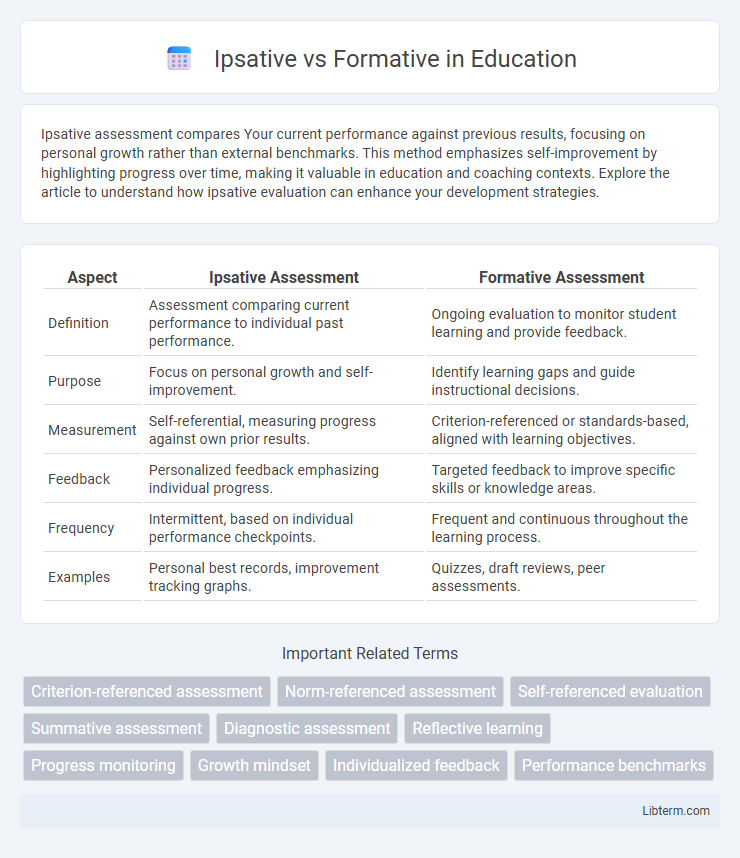Ipsative assessment compares Your current performance against previous results, focusing on personal growth rather than external benchmarks. This method emphasizes self-improvement by highlighting progress over time, making it valuable in education and coaching contexts. Explore the article to understand how ipsative evaluation can enhance your development strategies.
Table of Comparison
| Aspect | Ipsative Assessment | Formative Assessment |
|---|---|---|
| Definition | Assessment comparing current performance to individual past performance. | Ongoing evaluation to monitor student learning and provide feedback. |
| Purpose | Focus on personal growth and self-improvement. | Identify learning gaps and guide instructional decisions. |
| Measurement | Self-referential, measuring progress against own prior results. | Criterion-referenced or standards-based, aligned with learning objectives. |
| Feedback | Personalized feedback emphasizing individual progress. | Targeted feedback to improve specific skills or knowledge areas. |
| Frequency | Intermittent, based on individual performance checkpoints. | Frequent and continuous throughout the learning process. |
| Examples | Personal best records, improvement tracking graphs. | Quizzes, draft reviews, peer assessments. |
Understanding Ipsative and Formative Assessments
Ipsative assessments measure a learner's progress by comparing current performance against their previous results, emphasizing personal improvement and self-referenced growth. Formative assessments provide continuous feedback during the learning process, aimed at identifying strengths and weaknesses to guide instructional adjustments. Both assessment types are crucial for personalized education, with ipsative assessments tracking individual advancement and formative assessments enhancing ongoing learning development.
Key Definitions: Ipsative vs Formative
Ipsative assessment measures an individual's performance by comparing it to their previous results, emphasizing personal growth and self-improvement. Formative assessment evaluates learning through ongoing feedback, guiding learners toward mastery by identifying strengths and areas for development. Ipsative focuses on self-referenced progress, whereas formative centers on continuous evaluation to enhance overall understanding and skills.
Core Principles of Ipsative Assessment
Ipsative assessment centers on comparing a student's current performance against their previous achievements, emphasizing personal growth and self-improvement. It fosters intrinsic motivation by highlighting individual progress rather than external benchmarks. This method encourages self-reflection and goal-setting, making learning a personalized and continuous journey.
Core Principles of Formative Assessment
Formative assessment centers on ongoing evaluation to guide instructional adjustments and enhance student learning, emphasizing feedback, clear learning objectives, and active student involvement. It relies on diverse evidence collection methods, including quizzes, observations, and discussions, to identify gaps and areas for improvement. The core principles prioritize timely feedback, student self-regulation, and continuous monitoring to support personalized learning pathways and mastery of skills.
Comparative Analysis: Ipsative and Formative Methods
Ipsative methods evaluate an individual's performance against their previous results, emphasizing personal growth and self-improvement, whereas formative methods assess ongoing learning processes to provide real-time feedback for instructional adjustments. Ipsative assessments are often used in personalized learning environments and talent management, supporting motivation by highlighting progress, while formative assessments are integral in classroom settings to guide teaching strategies and enhance student understanding. The comparative analysis reveals that ipsative methods focus on intra-individual comparison, promoting self-awareness, whereas formative methods prioritize continuous evaluation to optimize learning outcomes and curriculum effectiveness.
Advantages of Ipsative Assessment
Ipsative assessment offers personalized feedback by measuring a learner's progress against their own previous performances, fostering intrinsic motivation and self-improvement. It reduces competitive pressure and anxiety often associated with normative assessments, creating a supportive learning environment. By emphasizing individual growth, ipsative assessment encourages continuous development and adaptive learning strategies tailored to each student's unique needs.
Benefits of Formative Assessment
Formative assessment provides continuous feedback that helps both educators and students identify learning gaps and adjust teaching strategies in real time. It encourages active learning and promotes student engagement by emphasizing progress and mastery rather than competition. This approach supports personalized instruction and improves long-term retention by addressing individual needs throughout the learning process.
When to Use Ipsative vs Formative Approaches
Use ipsative assessments when measuring personal progress or comparing an individual's current performance against their past achievements, ideal for self-improvement and motivation in educational or developmental settings. Formative assessments are best applied during ongoing learning processes to provide continuous feedback, guide instructional adjustments, and support knowledge acquisition in real time. Choose ipsative for individualized growth tracking and formative for adaptive teaching strategies and performance enhancement.
Examples of Ipsative and Formative Assessment in Practice
Ipsative assessment involves comparing a learner's current performance with their previous achievements, such as a student tracking their own progress through repeated writing tasks or fitness tests over time. Formative assessment gathers ongoing feedback to guide instruction, examples include quizzes, drafts, or classroom discussions that help teachers identify learning gaps and adjust teaching strategies. In practice, ipsative assessments emphasize self-improvement and personal benchmarks, while formative assessments focus on real-time understanding and skill development through teacher-student interaction.
Choosing the Right Assessment Strategy
Choosing the right assessment strategy involves understanding the differences between ipsative and formative assessments. Ipsative assessments compare a student's current performance against their previous work, emphasizing personal progress and self-improvement, while formative assessments provide ongoing feedback to guide learning and instructional adjustments. Selecting an appropriate method depends on goals such as motivating individual growth or informing teaching practices through real-time insights.
Ipsative Infographic

 libterm.com
libterm.com